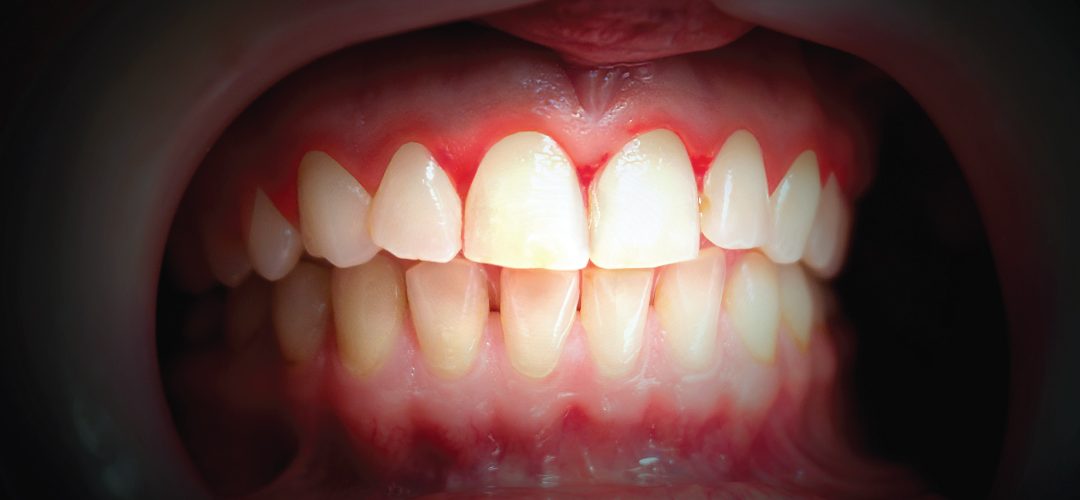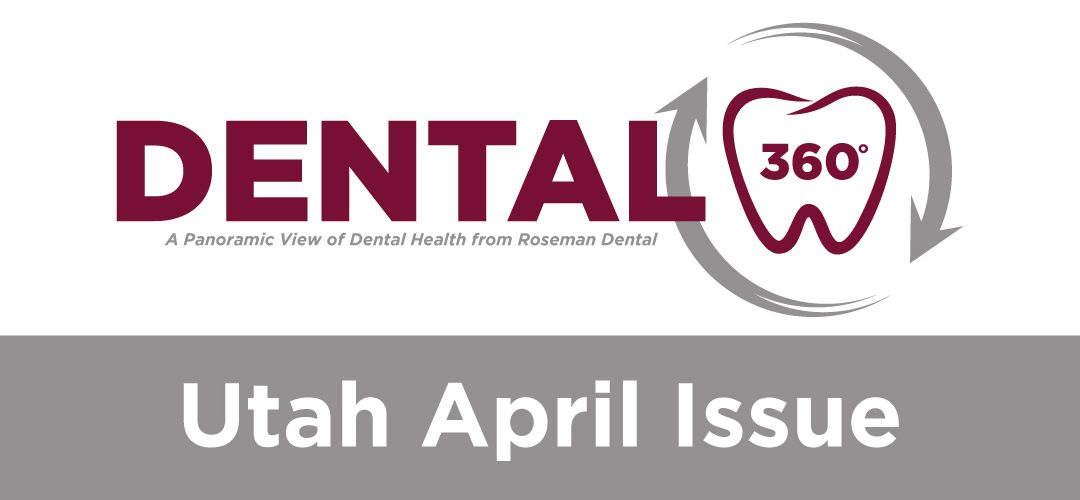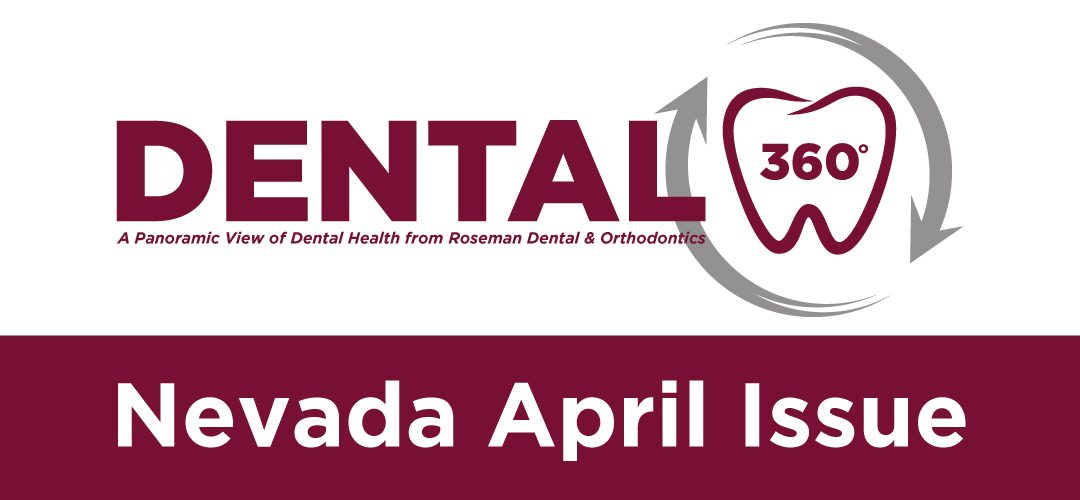
by Roseman Dental | May 10, 2021 | Dental 360, Dental Clinic Blog, Roseman Dental - NV, Roseman Dental - UT

by Roseman Dental | May 3, 2021 | Dental 360, Dental Clinic Blog, Oral Health, Roseman Dental - NV, Roseman Dental - UT
Let’s face it, most people dread hearing that they might need a root canal. For decades, people have feared root canal treatment because of common misconceptions regarding them. These fears are real as identified in a survey conducted by the American Association of Endodontists (AAE) where 59 percent of participants feared receiving a root canal and 53 percent of participants said they would rather have a snake in their lap for 15 minutes than partake in root canal treatment.
With over 25 million procedures conducted every year, millions of teeth are treated and saved through root canal treatment. Understanding the procedure and the benefits it provides can make all the difference in your future oral health, as well as alleviate any fears you may have.
What is a Root Canal?
A Root canal is a safe, convenient, and widely recommended endodontic treatment that relieves tooth pain and saves the natural tooth. Inside the tooth below the white enamel and hard layer (dentin) is the soft tissue (pulp). The pulp contains blood vessels, nerves, and connective tissue – all of which help the root of your tooth grow during development. Once a tooth is fully developed it can survive through the nourishment of the tissues surrounding it, therefore no longer needing the pulp. If a tooth becomes infected or inflamed, a root canal may be recommended to eliminate bacteria from the infected or inflamed root canal of the tooth which prevents reinfection and saves your natural tooth.
Is a Root Canal Painful?
A common misconception is that root canal treatment is extremely painful. While that may have been the case decades ago, modern technology and anesthetics have aided in the precision of the procedure and ease discomfort making the procedure virtually painless. In fact, the National Center for Biotechnology Information (NCBI) reports that 97 percent of root canal procedures are successful and 85 percent of teeth last a lifetime following the procedure. Additionally, patients who experience a root canal are six times more likely to describe the treatment as painless compared to those who have a tooth extracted.
What is the Procedure for a Root Canal?
A root canal can be performed by a general dentist or an endodontist who specializes in tooth pulp. The procedure is relatively straightforward and can be completed in just one or two visits. The procedure consists of removing the inflamed or infected pulp from the canal of the tooth then filling and sealing the tooth to prevent reinfection. These are the steps your dentist or endodontist will take when performing a root canal:
- Your dentist or endodontist will examine the tooth, take a radiograph using x-rays, and administer a local anesthetic. Once your tooth is numb, a small protective sheet (dental dam) is placed over the area to isolate the tooth – keeping it clean and free of saliva during the procedure.
- An opening is made in the crown of the tooth. The inside of the tooth is thoroughly cleaned and disinfected with very small instruments – removing the damaged pulp and any pus-filled sac that is in the canal to shape a space for the filling.
- The tooth is then filled with a biocompatible rubber-like material, called gutta-percha, to ensure complete sealing of the root canals.
- Lastly, your natural tooth will be restored with a crown (or a crown and post) or filling to protect your tooth and regain full function.
A root canal is often compared to a routine filling. Some patients have reported tooth sensitivity and mild soreness for the first few days proceeding treatment.
How long does a Root Canal Procedure take?
A root canal can be done in one to two visits – depending on the condition of your tooth and your unique circumstances. Typically, the first appointment consists of the removal of the pulp and any associated infection. During the second appointment, you could expect your tooth to be filled with a rubber-like material and then sealed with a crown or filling to prevent further infection and restore your natural tooth to its full capability. Each appointment lasts approximately 90 minutes.
What are the signs of needing a Root Canal?
A root canal is necessary when the pulp of your tooth becomes inflamed or infected. Some of the causes for the inflammation or infection could be:
- Deep decay
- Repeated dental procedures on tooth
- Crack or chip in tooth
- Injury to tooth
- Faulty crown
Untreated inflamed or infected pulp can lead to an abscess and lead to significant pain. Identifying your symptoms might help in the survival of your natural tooth. Here are a few symptoms that could indicate the need for a root canal:
- Severe pain while chewing or biting
- Pimples on your gums
- Chipped or cracked tooth
- Lingering sensitivity to hot or cold – especially after the sensation has been removed
- Swollen or tender gums
- Deep decay or darkening of your gums
Advantages of Root Canal Treatment
Root canal treatment is virtually painless and provides you with a pain-free, healthy mouth. Sweeping the misconceptions under the rug, the AAE identifies the below as advantages of a root canal:
- Saves your natural tooth
- Helps maintain your natural smile
- Limits the need for ongoing dental work
- Efficient and cost-effective
- Allows you to continue to eat the foods you love
If you’re experiencing any of the symptoms mentioned or have tooth pain, don’t hesitate to contact Roseman Dental. We will be able to diagnose the problem and provide you with the proper treatment.
For affordable, high-quality dental care in Henderson, Nevada and South Jordan, Utah contact Roseman Dental.
Nevada Location
Utah Location

by Roseman Dental | Apr 26, 2021 | Dental 360, Dental Clinic Blog, Roseman Dental - NV, Roseman Dental - UT
Don’t panic if your gums are swollen. Surprisingly, it’s a common issue among people and in most cases, swollen gums are easily treated. Your gums are made of firm, pink, thick fibrous tissue full of blood vessels which cover your jawbone. Swollen gums, also known as gingival swelling, is when your gums are abnormally enlarged, bulging or protruding. When your gums are swollen it’s a sign they are irritated due to some type of issue and can be sensitive and painful.
Causes of Swollen Gums
There are several causes of swollen gums.
Gingivitis
Gingivitis is the most common cause of swollen gums. Gingivitis, also known as gum inflammation, is a form of gum disease that causes inflamed gums. The inflamed gums are due to plaque, a naturally occurring sticky film containing bacteria – also known as biofilm – that builds up on your teeth and produces toxins that irritate the gums. If you have gingivitis, your gums can be swollen, puffy, receding, sometimes tender, or bleed easily. Untreated gingivitis can develop into a more severe form of gum disease known as periodontitis, a major cause of tooth loss in adults.
Food Debris
If you notice swelling around just one tooth, it is possible there is food stuck under your gums. Make sure to floss and brush properly and the swelling should resolve in a few days? go away on its own. If the swelling persists, make sure to schedule an appointment with your dentist. Leaving food under your gums can lead to gum disease.
Pregnancy
During pregnancy there are a lot of hormonal changes that occur. These hormonal changes can cause swollen, inflamed and sensitive gums.
Abscessed Tooth
An abscessed tooth is a pocket of pus that’s caused by a bacterial infection. Your dentist will treat an abscessed tooth by draining the pocket of infection. Signs that you may have an abscessed tooth include not only red or swollen gums, but throbbing pain, swollen jaw or face, a tender or sore tooth, and fever. Make sure to schedule an appointment right away with your dentist if you are experiencing these symptoms.
Braces
Braces are designed to move and adjust teeth slowly over time. Braces cause a constant, steady pressure to your teeth that causes change to happen in your gums and jawbone. Having swollen gums is expected with braces, especially when they are first adhered or tightened. Braces with swollen gums is completely normal but brushing and flossing regularly will help reduce the amount of gum soreness you experience around your teeth. Having good oral hygiene while having braces will also help prevent gingivitis, the main cause of swollen gums. With braces it is a lot easier to get food stuck in the gums which can lead to gingivitis if proper oral hygiene isn’t practiced.
Additional Potential Causes
Other potential causes of swollen gums include:
- Poor Oral Hygiene
- Infection – Viral or Fungal
- Medication Side Effects
- Poor Nutrients
- Mouthwash or Toothpaste Sensitivity
- Dentures or Dental Appliances Fitting Poorly
Age, stress, obesity, tobacco, and genetics are also known to increase your risk of gum swelling.
Preventing Swollen Gums
The best thing you can do to prevent yourself from getting swollen gums is to practice good oral hygiene and visit your dentist on a regular basis – every six months for a cleaning and checkup. Good oral hygiene includes:
- Brushing your teeth at least twice a day at a 45-degree angle
- Brushing away from your gums to remove debris at or below your gumline
- Using a soft bristled toothbrush or an electric toothbrush – they’re more effective at removing plaque
- Cleaning between your teeth every day – flossers, interdental brushes or water flossers work well
- Using a mouthwash to help reduce accumulation of bacteria and plaque
If your swollen gums last for an extended period – more than a few days – or you are concerned about your gums, schedule an appointment with your dental provider. They will be able to diagnosis the problem and start treatment.
For affordable, high-quality dental care in Henderson, Nevada or South Jordan, Utah contact Roseman Dental.
Nevada Location
Utah Location

by Roseman Dental | Apr 12, 2021 | Dental 360, Dental Clinic Blog, Roseman Dental - UT
It’s a new month and Spring has finally arrived. The time has come where we can start enjoying the warmer weather, the beautiful flowers beginning to bloom, and the great outdoors. April is a month to be appreciative of the world around us, but it is also a time to bring awareness to Parkinson’s Disease and Oral Cancer. April is Parkinson’s Disease (PD) Awareness Month. PD is a nervous system disorder that affects movement. Approximately 60,000 Americans are diagnosed with PD each year and over 10 million people worldwide are living with it. Join Roseman Dental and the Parkinson’s Foundation this month to #KnowMorePD. This month is also Oral Cancer Awareness Month. Oral Cancer is cancer of the mouth and upper throat. Every hour, 24-hours-a-day, 365-days-a-year, someone dies of oral or oropharyngeal cancer. Yet, with early detection and treatment, Oral Cancer has high rates of survival. Make sure to get screened for Oral Cancer at your next dentist appointment.
During this month’s issue of Dental 360°, you’ll gain insight into how Parkinson’s Disease impacts dental health (link to article), a 360° look at Oral Cancer and gain a better understanding of tooth sensitivity and why you may have it (link to article).
Roseman Dental’s Dental 360° is a monthly e-newsletter. Each month you’ll receive a panoramic view of dental health. Dental health is key to your overall health and here at Roseman Dental, we are dedicated to improving not only your mouth, but your whole self. At our clinic we have an excellent team of licensed dentists, dental residents and students, and dental assistants and hygienists all focused on you and your family’s oral health. We offer comprehensive care, are a one stop shop for all your dental needs and offer dental care at a cost typically lower than what you would find at a traditional dental office. Roseman Dental has been serving its community since 2011 and we look forward to continuing to serve you and your family.
We hope you find Dental 360° helpful and informative. We look forward to connecting with you monthly.
Dental 360° April Articles
Parkinson’s Disease & Dental Health
Oral Cancer Awareness
Tooth Sensitivity & Why I Have It

by Roseman Dental | Apr 12, 2021 | Dental 360, Dental Clinic Blog, Roseman Dental - NV, Roseman Dental - UT
Do you ever feel pain when you consume certain foods or drinks that are hot, cold, sweet or acidic? You may be suffering from tooth sensitivity, also known as dentine hypersensitivity (DH) or dentine sensitivity (DS). Tooth sensitivity is defined as pain or discomfort in the teeth as a response to certain triggers or stimuli, such as hot or cold temperatures. Sensitivity occurs when tooth enamel is thinned.
Tooth Enamel
Tooth enamel is the visible, outermost covering of your teeth. The color of healthy enamel varies from light yellow to a gray or blue-like white. It’s the hardest substance in the human body and contains a high percentage of minerals. It protects the inner, more fragile areas of your teeth known as pulp and dentin. Taking care of your enamel is very important because it is the first line of defense against tooth sensitivity and tooth decay – the most common dental condition worldwide.
How Tooth Enamel is Worn Down
Tooth enamel can be worn down by brushing your teeth too hard, using a hard toothbrush, grinding your teeth at night – also known as sleep or nocturnal bruxism – and regularly eating or drinking acidic foods and beverages. It can also be worn down from repeated exposure to extreme temperatures.
Treating Tooth Sensitivity at Home
If you are experiencing tooth sensitivity, there are some things you can try that are considered over-the-counter dental treatments, but it is always important to consult with your dentist about your teeth sensitivity as they have the most knowledge and expertise in this area.
Desensitizing Toothpaste
Select a toothpaste that’s labeled as being specifically made for sensitive teeth. These types of toothpaste won’t have irritating ingredients. Some of these types of toothpastes also can contain desensitizing ingredients that can assist in blocking the discomfort from traveling to the nerve of the tooth. If you’re not sure what desensitizing toothpaste is right for you, consult with your dentist.
Alcohol-free Mouthwash
Mouthwash that does not contain alcohol will be less irritating to sensitive teeth.
Soft Toothbrushes & Brushing Softer
Tooth enamel can be worn down by brushing too hard and using a hard-bristled toothbrush. Try brushing softer and using a soft-bristled toothbrush or electric toothbrush.
Treating Tooth Sensitivity at the Dentist
If the at-home remedies just aren’t working, make sure to schedule an appointment with your dentist. There are a variety of things they can do to assist with tooth sensitivity.
Fluoride
Your dentist might apply fluoride to the sensitive areas of your teeth to strengthen tooth enamel and reduce pain. Your dentist might also suggest the use of prescription fluoride at home, applied via a custom tray.
Desensitizing or Bonding
Occasionally, exposed root surfaces can be treated by applying bonding resin to the sensitive root surfaces. A local anesthetic might be needed.
Surgical Gum Graft
Gum graft, also known as gingival graft, can be performed when your gums are receding. Gum recession exposes the roots of your teeth and can cause sensitivity and lead to tooth decay. If your tooth root has lost gum tissue, a small amount of gum tissue can be taken from elsewhere in your mouth and attached to the affected site. This can protect exposed roots and reduce sensitivity.
Root Canal
If your sensitive teeth cause severe pain and other treatments aren’t effective, your dentist might recommend a root canal — an endodontic treatment used to treat problems inside the tooth, known as the soft core or dental pulp. While this might seem like a significant treatment, it’s considered the most successful technique for eliminating tooth sensitivity.
If you’re experiencing teeth sensitivity schedule an appointment with Roseman Dental. Our skilled team will examine the affected teeth and recommend treatment to reduce your sensitivity.
Nevada Location
Utah Location

by Roseman Dental | Apr 12, 2021 | Dental 360, Dental Clinic Blog, Roseman Dental - NV
It’s a new month and Spring has finally arrived. The time has come where we can start enjoying the warmer weather, the beautiful flowers beginning to bloom, and the great outdoors. April is a month to be appreciative of the world around us, but it is also a time to bring awareness to Parkinson’s Disease and Oral Cancer. April is Parkinson’s Disease (PD) Awareness Month. PD is a nervous system disorder that affects movement. Approximately 60,000 Americans are diagnosed with PD each year and over 10 million people worldwide are living with it. Join Roseman Dental & Orthodontics and the Parkinson’s Foundation this month to #KnowMorePD. This month is also Oral Cancer Awareness Month. Oral Cancer is cancer of the mouth and upper throat. Every hour, 24-hours-a-day, 365-days-a-year, someone dies of oral or oropharyngeal cancer. Yet, with early detection and treatment, Oral Cancer has high rates of survival. Make sure to get screened for Oral Cancer at your next dentist appointment.
During this month’s issue of Dental 360°, you’ll gain insight into how Parkinson’s Disease impacts dental health, a 360° look at Oral Cancer and the spring discounts Roseman Dental is offering for orthodontic treatment.
Roseman Dental & Orthodontics’ Dental 360° is a monthly e-newsletter. Each month you’ll receive a panoramic view of dental health. Dental health is key to your overall health and here at Roseman Dental & Orthodontics, we are dedicated to improving not only your mouth, but your whole self. At our clinic we have an excellent team of licensed dentists, orthodontists, orthodontic residents – 30 to be exact, and dental residents all focused on you and your family’s oral health. Roseman Dental & Orthodontics has been serving its community since 2009 and is a comprehensive, one stop shop for all your dental needs including dental, orthodontic and craniofacial cleft lip & palate treatment.
We hope you find Dental 360° helpful and informative. We look forward to connecting with you monthly.
Dental 360° April Articles
Parkinson’s Disease & Dental Health
Oral Cancer Awareness
Spring into a Fresh Smile – New Orthodontic Discounts
Subscribe to e-newsletter











